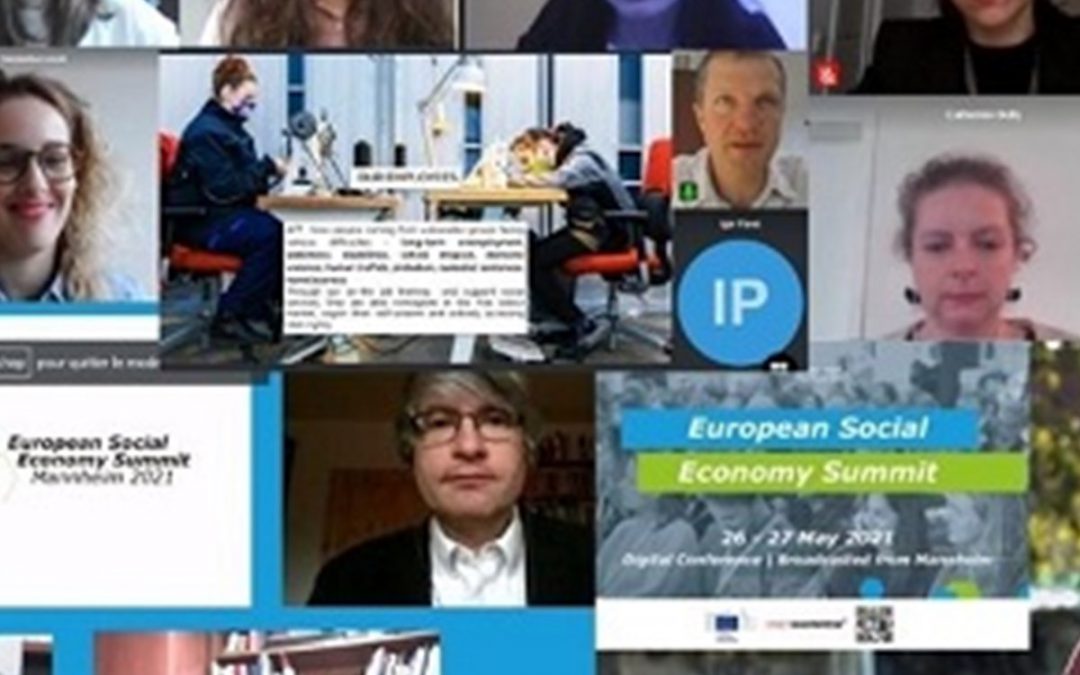From ENSIE: https://www.ensie.org/newsroom/news/ensie-participated-to-the-euses
Last week, on the 26th and 27th of May, ENSIE participated to the European Social Economy Summit (EUSES), a digital conference jointly organised by the European Commission and the City of Mannheim (DE). ENSIE participated to the moderation of one session, co-organised three sessions, and followed several very interesting ones.
Last week, on the 26th and 27th of May, ENSIE participated to the European Social Economy Summit (EUSES), a digital conference jointly organised by the European Commission and the City of Mannheim (DE). ENSIE participated to the moderation of one session, co-organised three sessions, and followed several very interesting ones.
On May, 26th, ENSIE’s Director, as vice-President of Social Economy Europe (SEE), Patrizia Bussi, had the honour to moderate the European Parliament’s Social Economy Intergroup and SEE session on “Mainstreaming Social Economy in EU policies”. During this session, many interesting and concrete proposals for the future European social economy action plan have been pointed out, such as the necessity of true commitments in legislative changes, the need to improve the public procurement Directive and the European statutes for Social Economy organisations (Foundation, Mutual, Association…) as well as their budgetary consequences. The need of an EU digital platform dedicated to the social economy, with links to EU funding opportunities, has also been underlined, as this would improve the visibility of the sector.
On the 27th, ENSIE organised a session on the “Importance of the social impact measurement for social entrepreneurship/Work Integration Social Enterprise (WISEs) which has been a huge success, with more than 65 participants! This session was the opportunity to listen to a diverse panel composed of national and EU networks (ConcertES & EVPA) as well as national WISE’s representatives from Spain (FAEDEI) and Austria (arbeit plus). The audience discovered different social impact measurement practices for WISEs but also innovative and inspiring methodologies as the one developed in the framework of the INTERREG project “VISES” which aimed to conceive and test a system appropriate to value the social impact of social entrepreneurship. This exchange allowed participants to better understand the dynamics behind the measurement of the social impact from the investors and beneficiaries’ sides. Finally, the session underlined that not only quantitative but also qualitative variables are crucial to better reflect the reality and the impact WISEs are creating on the daily basis.
On the 27th, ENSIE coorganised a session on “Innovation and digitalisation in Europe’s work integration social enterprises (WISEs)” with, EASPD, EURICSE, Fundacion ONCE and AfB Group. This session aimed at providing an overview of digital and innovation practices within the WISEs sector across Europe. The session started with an explanation on what are WISEs in Europe and what innovation means within the sector, a general insight of the B-WISE project, the Blueprint for Sectoral Cooperation on Skills in WISEs project, has been provided by the coordinator of the project, Konstantina Leventi, Project Manager at EASPD. It was followed by several workshops that gave participants the opportunity to learn what WISEs or WISEs networks at national/regional levels are implementing to deal with the digital and green transitions on the ground and how this affect their work. Notably, Ateliere Fara Frontiere (Romania) and ŠENT (Slovenia) explained the improvements made in both digital and green areas in the last years as well as the methods used to convert challenges into opportunities for WISEs and disadvantaged workers. The COVID-19 crisis has affected the way of working and the financial sustainability of several WISEs, but thanks to cooperation among actors working within social economy as well as to the public support and the youngsters, innovation measures have allowed to renovate and help the sector. At the end, digital skills gaps, upskilling and reskilling issues have been discussed to display how the B-WISE project is key as it will develop a strategy to overcome them at European level.
The last session coorganised by ENSIE with AEIDL, REVES, Diesis, Caritas Europa, Social Economy Europe and Diakonie Deutschland focused on “Tapping the potential of the social economy to make socially responsible public procurement”. This session focused on the explanation of how supporting the development of socially responsible public procurement could be a real boost for the social enterprises and WISEs. The future social economy action plan should implement more awareness raising activities towards Member States and public authorities on the sustainable public procurement. Indeed, some goods instruments already exist but are not well exploit.
ENSIE also followed several sessions during EUSES which were very interesting for the network and WISEs in general. The team participated to the “Opportunities and challenges for Buy Social” session, which addressed the topic of private procurement. During this session, it has been underlined that European support policies are needed in order to promote the collaboration between for profit enterprises and social enterprises and WISEs. This could be done following the good examples that already exist.
ENSIE followed also the “ESF+: new boost for Social innovation “ session and was happy to learn that the new ESF+ will strongly support social innovation through the lines: 1) for new ideas and solutions with the EaSI strand ‘social experimentation project at EU level’ and ‘ESF+ for social innovation in the Member States’; 2) for projects scaling thanks to the ESF+ for transnational cooperation at EU-level and 3) for mainstreaming with the ‘ESF+ for social innovation in the Member States’. In order to implement this, the European Commission has created a Social Innovation database, a European competence centre for social innovation and many national competence centres for social innovation. Finally, ENSIE attended three interesting sessions focusing on WISEs and social enterprises regional cooperation, Western Balkans, and Eastern Partnership. The first session was entitled “Social Entrepreneurship in Western Balkans: Ways to open the fast track to sustainable development”. It focused on the possible ways to support social enterprises in the region, increasing regional cooperation and building partnership within the EU. During the panel discussion, the fundamental role of Social enterprises and WISEs in the integration of remote communities and disadvantage groups in the Western Balkans countries, which increased during the pandemic, has been highlighted. The panel was presenting networks from Serbia, North Macedonia, Bosnia Herzegovina, Albania, and Montenegro. Juliana Hoxha, Director of Partners Albania, involved with other members and partners in the development of ENSIE’s Action Plan on Western Balkans, reiterate the importance of the partnership and cooperation with European and regional WISEs and social enterprises networks.
On the 27th, ENSIE took part in the panel discussion on “Social Economy in the Eastern Partnership countries – policy challenges and cooperation opportunities”. The development of Social enterprises and WISEs is important in Eastern Partnership countries and should be supported, through the creation of transnational regional networks and awareness raising. ENSIE member Eco Razeni is engaged in the promotion and awareness raising about the role of social enterprises in the Republic of Moldova, country where we can ascertain the development of a concrete legal framework for WISEs and social enterprises. Last but not least on the 27th ENSIE took part also to the EUSES session on “How to strengthen regional cooperation through social entrepreneurship” .Also this meeting has been rich of interesting points of analysis, analysing among others the important cooperation between social enterprises in the inclusion of young people and for the training of new young social entrepreneurs.
The ENSIE team was very happy to participate to the various session of EUSES, it has been two enriching days! The event concluded with the Mannheim Declaration on Social Economywhich will feed the preparations of the European action plan for the social economy, expected for next fall. You can also find our position here. Finally, we were delighted to learn that there will be a follow up to this Summit, in Strasbourg, next February!


